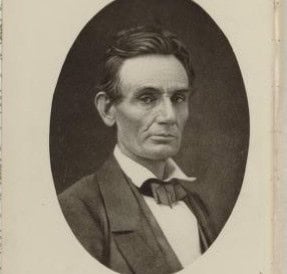The American Civil War was fought from April 12, 1861 to April 9, 1865. It was a most savage and brutal war. At the time the population of the United States was around 30 million. The civil war resulted in the deaths of approximately 620,000 individuals. This is a staggering figure for a single nation, and that too 160 years ago! If one were to extrapolate these figures to the current US population of 341.8 million, the deaths would stand at a little over 7 million! The one man responsible for this carnage and bloodshed was none other than the much revered Abraham Lincoln. Why was the unnecessary war really fought, how did it impact the real character of the Federation known as the United States, and what was Lincoln’s true role in this bloody episode? These questions will be addressed briefly in what follows.
The civil war was fought, not about slavery as is usually and mistakenly thought. The war was fought over the right to secede. The United States of America came into being when several states seceded from the British Crown. In the words of Professor Thomas DiLorenzo, “The Declaration of Independence was, first and foremost, a declaration of secession from the British government of King George III, whom the founders believed was a tyrant.” This document was written by Thomas Jefferson, who, though a strong believer in the Union, nonetheless believed in the right of states to secede, if they felt that the government had become inimical to the rights of life, liberty and property. In his first inaugural address of 1801 Thomas Jefferson clearly stated: “If there be any among us who wish to dissolve this Union or to change its republican form, let them stand undisturbed as monuments to safety with which error of opinion may be tolerated where reason is left free to combat it.” It is therefore clear that Thomas Jefferson upheld the right of the States to secede from the Union. And in the civil war the Southern states argued that they had a right to secede if they felt so. Lincoln would not allow them the exercise of this constitutional right. And that is what brought about the bloody and unnecessary civil war.
It is extremely important to bear in mind that Lincoln was not at all opposed to slavery. His views about the slaves need to be known if one has to understand why he manipulated and precipitated the civil war. Lincoln was opposed to racial equality. In 1858, while debating in Ottawa, Illinois, he responded to Senator Stephen Douglas as follows: “I have no purpose to introduce political and social equality between the white and black races. There is a physical difference between the two, which in my judgment, will probably forever forbid their living together upon the footing of perfect equality; and inasmuch as it becomes a necessity that there must be a difference, I, as well as Judge Douglas, am in favor of the race to which I belong having the superior position. I have never said anything to the contrary.” He once said of emancipation: “Free them and make them socially and politically our equals? My own feelings will not admit of this . . . We cannot, then, make them equals.”
Lincoln was not, and never had been, “in favor of making voters or jurors of Negroes, nor of qualifying them to hold office, nor to intermarry with white people.” Therefore, when he referred to slavery was as a “monstrous injustice” he did not really mean it because he was not in favor of giving those rights to slaves that would enable them to pursue life, liberty and happiness as laid down in the Declaration of Independence. “It was a textbook example of a masterful, rhetorically gifted, fence-straddling politician wanting to have it both ways – in favor of and opposed to racial equality at the same time – in an attempt to maximize his political support.” He referred to Negroes as an inferior race on more than a dozen occasions between 1854 and 1860. In fact, he believed that all colored people were inferior and referred to Mexicans a “mongrels”.
In view of the foregoing, it is one of the greatest distortions of history, whereby Lincoln has gone down in history as a champion of racial equality. He was never in favor of racial equality. His role model and mentor was a man named Henry Clay. When Clay died in 1852 Lincoln said: “During my whole life I have revered [Henry Clay] as a teacher and leader.” Clay was a slave owner. “I can express all my views on the slavery question by quotations from Henry Clay” said Lincoln. This meant that Lincoln and Clay had identical views on slavery. The views, as described by Lincoln biographer Robert W. Johanssen, were, “opposition to slavery in principle, toleration of it in practice, and a vigorous opposition towards the abolition movement.” And yet Lincoln has gone down in history as a great emancipator of slaves.
The fact of the matter is that Lincoln did not free a single slave through his much publicized Emancipation Proclamation. At the time the Federal army of Lincoln had occupied much of Tennessee, Louisiana and Virginia, regions which had thousands of slaves. But the Proclamation applied only to rebel territories and its intention was to provoke a black revolt on farmlands in the rebel regions of the South where the men had gone to fight the Federal army and only white women and slaves were left on the farms! Lincoln’s Secretary of State William Seward mocked the Emancipation Proclamation in the following words: “We show our sympathy with slavery by emancipating slaves where we cannot reach them and holding them in bondage where we can set them free.” The London Spectator commented correctly: “The principle [of the Proclamation] is not that a human being cannot justly own another, but that he cannot own him unless he is loyal to the United States.” The New York World wrote: “The President has purposely made the Proclamation inoperative in all places where we have gained a military footing which makes the slaves accessible. He has made the proclaimed emancipation only where he has notoriously no power to execute it. The exemption of accessible parts of Louisiana, Tennessee and Virginia renders the proclamation not merely futile but ridiculous.”
Thus, for Lincoln, the civil war was not about emancipating slaves. He referred to the Emancipation Proclamation as a “war measure” in a letter to Salmon P. Chase, his Secretary of Treasury. In the letter he admitted that the Emancipation Proclamation had no other legal justification. In an 1862 letter to Horace Greeley, the editor of the New York Tribune, Lincoln wrote: “My paramount object in this struggle is to save the Union and is not either to save or destroy slavery. If I could save the Union without freeing any slave I would do it; and if I could save it by freeing some and leaving others alone I would also do that. What I do about slavery, and the colored race, I do because I believe it helps to save the Union.”
It is extremely important to note that among the founding fathers of the United States there were differences. Men like Thomas Jefferson and James Madison upheld the supremacy of the States and believed that the Confederation was an agent of the States. Men like Alexander Hamilton favored a strongly centralized government. But the most significant thing is that even Alexander Hamilton was strongly against the use of force to compel states to remain part of the Union, something which Lincoln did. Discussing the issue of the Federal government suing a State over unpaid debts he stated that waging war against a state would be “altogether forced and unwarranted.” Speaking at the constitutional convention Hamilton said: “To coerce states is one of the maddest projects that was ever devised. . . . What picture does this idea present to our view? A complying State at war with a non-complying State: Congress marching the troops of one state into the bosom of another? Here is a nation at war with itself. Can any reasonable man be well disposed toward a government which makes war and carnage the only means of supporting itself – a government that can exist only by the sword?” Lincoln made war and carnage to prevent the Southern states from exercising their constitutional right to secede. None of the founding fathers would have ever accepted what he did.
The need to secede from a Union would arise if a State or States felt that the central government was exploiting them by engaging in unconstitutional acts or imposing taxes or policies unfavorable to them. During the war against England in 1812, the New England states practically seceded from the Union by refusing to send troops requested by President James Madison. Nobody questioned the right of states to secede and the federal government never used force to compel New England to comply. For the founding fathers free speech, freedom of association and the right to secession were of great importance and they protected these rights.
Abraham Lincoln however was cast differently. He imposed his will upon the states of the South through war and a series of highly unconstitutional steps. He invaded the South without consulting the Congress as required by the Constitution. Lincoln declared martial law and illegally blockaded Southern ports. Even though he was a lawyer, he showed the utmost disregard for the Constitution and suspended the writ of habeas corpus. He then imprisoned thousands of Northern citizens without trial because they were critical of his policies. He hit the media very hard by imprisoning, without trial, newspaper publishers who were critical of him and censored all telegraphic communication in addition to nationalizing the railroads. Lincoln engaged in massive violations of the Constitution – he confiscated private property and firearms in violation of constitutional provisions. If the newspaper publishers tried to persist in their criticism of his policies he simply forced them to close their business. He behaved as a dictator, behavior that would have absolutely been rejected by the founding fathers unanimously. Yet his unconstitutional and dictatorial conduct is glossed over by standard history.
Chief Justice Robert B. Taney issued an opinion on the suspension of the writ of habeas corpus by Lincoln. Justice Taney opined that the president had no lawful power to do so. He cited English and Colonial American precedents and pointed out that the writ of habeas corpus was in a section of the Constitution that pertained to legislative powers, and not executive powers. Taney argued that the Constitution was drawn up after a war against the King of England and the founders could never give “more regal and absolute power” to the American president over the life and liberties of Americans than that enjoyed by the King of England. But his opinion did not affect Lincoln’s conduct. Taney recommended that treason be dealt through normal judicial procedures and expressed the clear opinion that in the other case, “the people of the United States are no longer living under a government of laws; but every citizen holds life, liberty and property at the will and pleasure of the army officer in whose military district he may happen to be found.” Taney directed that the government ensure that civil processes of the United States were respected and enforced. Taney’s judgment was conveyed to Lincoln by courier, but Lincoln, though enraged, never appealed against the judgment. Instead he chose to ignore it.
It is important that the writ of habeas corpus had been suspended in the North where the federal government held sway and was intended to coerce the subjects to go along with what Lincoln desired. By 1862 the military officers could imprison anyone who resisted or opposed Lincoln’s policies. Professor Thomas DiLorezo writes: “The arbitrary arrests continued unabated, and, by 1862, the suspension of habeas corpus had been expanded to include anyone who ‘discouraged voluntary enlistment’ in the army or who participated in any ‘disloyal practice,’ with the military given broad discretion in determining what constituted disloyalty. Martial Law enabled the military to arrest and imprison thousands of citizens, sometimes on mere rumors. Northern citizens were subjected to the threat of arbitrary arrest by the military for the duration of Lincoln’s administration.” Through such extreme dictatorial and unlawful measures Lincoln managed to quell and suppress all opposition to his policy of opposing secession.
Professor DiLorenzo describes what went on in the North during the Lincoln era. As a result of the suspension of habeas corpus and declaration of martial law “thousands of anti-war protestors, including myriad newspaper editors and owners and even priests and preachers” were imprisoned. Lincoln’s Secretary of State William Seward set up a secret police that arrested thousands of people on charges of disloyalty, with disloyalty being defined as disagreement with Lincoln’s war policies. Such dictatorship in the United States could never have been imagined prior to Lincoln whose utter disregard for the Constitution and legal procedures is utterly astounding in view of the fact that he himself was a lawyer. The dictator in Lincoln completely subdued his legal sense. “There was no legal process at all, and many Northern citizens were imprisoned for such alleged infractions as ‘being a noisy secessionist’, selling Confederate trinkets . . .’ An Episcopal minister in Alexandria, Virginia, was arrested for omitting a prayer for the President of the United States in his church services as required by the Lincoln administration.”
The war broke out in April 1861. In May 1861 an election was held to fill ten vacant seats in the Maryland House of Delegates. However, because they were suspected of having sympathies for secessionists, most of those elected were arrested and sent to military prison without trial whereas some fled. Those elected included physicians, lawyers, judges and industrialists from Baltimore. This was the only election in American history where every elected person either ended up in prison or fled into exile! This shows the extent of tyranny exercised by Lincoln. “Seward famously boasted to the British Ambassador, Lord Lyons, that he could ‘ring a bell’ and have a man arrested in Ohio, New York or any other state, and was apparently thrilled that he had even more power over the population than the Queen of England had.” This shameful state of affairs was the doing of only one man – Abraham Lincoln. Lincoln knew very well that his acts were criminal. Therefore, in 1863, an “indemnity act” was passed that protected the President, his cabinet and military officers against prosecution for the unconstitutional and illegal arrests!
Lincoln crossed all limits in suppressing dissent. The indemnity act had to pass through the Senate to become law. It never received enough votes from the Senate to become law. “The presiding officer of the Senate simply declared the law valid, adjourned the Senate, and let the dissenters voice their protest.” The indemnity act was in conflict with the principle that no man, and particularly no government servant, is above the law. There was a tremendous sense of outrage against this act and by the end of the war there were thousands of lawsuits against the illegal warrantless arrests. After Lincoln’s death the U.S. Supreme Court passed a historic judgment (ex-parte Milligan U.S. 2 1866): “The Constitution of the United States is a law for rulers and people equallin war and peace, and covers with shield of its protection all classes of men, at all times and under all circumstances. No doctrine, involving more pernicious consequences, was ever invented by the wit of man that any of its provisions can be suspended during any of the great exigencies of the government.” The judgment came late for many imprisoned people; had it been passed during Lincoln’s lifetime, he would have ignored it.
Lincoln was not a statesman, but was, instead, a shrewd and clever politician. He was determined not to allow the Southern states to exercise their constitutional right to secede. He however manipulated things in a manner that eventually generated a patriotic fervor in the North. Fort Sumter was located in the South, in South Carolina, a state that wished to secede. The Confederate States of America could not tolerate a Federal fort in their territory. Lincoln had been advised by most of his cabinet as well as his top military advisor General Winfield Scott to abandon Fort Sumter. Lincoln lied by stating over and over again that he was not re-provisioning Fort Sumter which had run out of supplies but actually sent a naval force to re-provision his forces at Fort Sumter. The naval force was accompanied by battleships. Lincoln was sending provisions to Fort Sumter even though he had been warned by his advisors that supplies to Fort Sumter would be fired upon. Lincoln provoked South Carolina by sending these supplies – either the Confederate army would fire upon bread carrying ships or back out of their threat to do so. Lincoln wanted the Confederates to fire upon bread provisions and be seen as firing on bread being sent to hungry men. When South Carolina bombarded Fort Sumter for 36 hours, damaging the Fort but hurting no one, a feeling arose in the North of preserving the Union. This is exactly what Lincoln desired.
Important newspapers in the North saw through Lincoln’s ploy. The Jersey City American Standard wrote on April 12, 1861 that “this unarmed vessel is a mere decoy to draw the first fire from the people of the South, which act by the pre-determination of the government is to be the pretext for letting loose the horrors of war.” The following day, on April 13 the Providence Daily Post wrote: “For three weeks the administration newspapers having been assuring us that Fort Sumter would be abandoned, but Mr. Lincoln saw an opportunity to inaugurate civil war without appearing in the character of an aggressor.” On April 16, the Buffalo Daily Courier wrote in an editorial: “The affair at Fort Sumter . . . had been planned as a means by which the war feeling at the North should be intensified.” The New York Evening Day Book wrote on April 17 that the event at Fort Sumter was a “cunningly devised scheme to arouse, and if possible, exasperate the northern people against the South.”
Lincoln was hell bent upon war to the extent that when, before the Fort Sumter incident, in March 1861, Jefferson Davis appointed a number of peace commissioners to visit Washington D.C. to pay for any Federal property in the South and to pay the Southern portion of the national debt, Lincoln refused to see them. These peace commissioners had been appointed in accordance with a resolution of the Confederate Congress. When Napoleon III of France offered to mediate, Lincoln refused to meet him either! Confederate Secretary of State Robert Toombs understood Lincoln very well and advised against firing upon Fort Sumter. He said that it would be “suicide” to attack Fort Sumter as the South would “lose every friend in the North.” He was right. Lincoln further destroyed all support in the North for the right of secession by imprisoning thousands of war opponents and destroying and shutting down dozens of newspapers that opposed his policies.
The suppression of free press by Lincoln was in contravention of the Constitution and the vision of the founding fathers of the United States. The suppression began when, in May 1861, the New York paper Journal of Commerce published a list or more than one hundred Northern newspapers that had written editorials against going to war. Lincoln ordered the Postmaster General to deny mail delivery to all those papers. In those days most papers were delivered by mail and such a step put these papers out of circulation. Some papers resumed circulation after promising not to oppose Lincoln’s policies. The founder of Journal of Commerce sold his ownership of paper and withdrew from its management rather than see it become extinct. The editor of Daily News hired private couriers and delivery boys after being denied mail delivery by the post office. Lincoln then ordered Federal marshals to confiscate the paper throughout the cities of the North. As a result the paper went into bankruptcy. The editor of Freeman’s Appeal was arrested and sent to Fort Lafayette As a result Freeman’s Appeal suffered censorship.
Professor DiLorenzo writes: “Among the other papers that suffered the same fate and were censored by Lincoln were the Chicago Times, Dayton Empire, Louisville Courier, Maryland News Sheet, Baltimore Gazette, Daily Baltimore Republican, Baltimore Bulletin, Philadelphia Evening Journal, New Orleans Advocate, New Orleans Courier, Baltimore Transcript, Thibodaux (Louisiana) Sentinel, Cambridge Democrat (Maryland), Wheeling Register, Memphis News, Baltimore Loyalist, and Louisville True Presbyterian. (The Louisiana papers mentioned were in territory that was occupied by the Federal army at the time.” Fort Lafayette was full of imprisoned newspaper editors who had questioned Lincoln’s policies. On several occasions mobs of Federal officers or Unionists ransacked and destroyed property of those newspaper offices which had criticized Lincoln’s policies. Through such dirty and foul and illegal methods Lincoln intimidated those opposed to him. Lincoln was, without a doubt, a dictator who could not tolerate one word of criticism of his policies and who did everything in his power to intimidate his critics.
Lincoln had expected the war to be a short affair but he was mistaken. He then made all-out war against the civilian population of the South in contravention of international law. Lincoln’s treatment with Southern civilians was extremely brutal. He blockaded all ports and inland waterways creating severe shortages of such items as drugs and medicine. But much more than that his most trusted generals, Sherman, Grant, and Sheridan engaged in burning down entire towns to seek vengeance. When in 1862 General Sherman was attempting to bring Memphis, Tennessee under Federal control their gunboats were targeted by Confederate snipers. Sherman took his revenge by burning down the entire town of Randolph, Tennessee. He ordered his subordinate Col. Walcut to burn the entire town but leave one house standing to mark the place where once an entire town stood. Sherman wrote to his wife that his aim was “extermination, not of soldiers alone, that is least part of the trouble, but the people.”
The armies of Lincoln engaged in holding randomly chosen civilians as hostages. These hostages were shot sometimes and sometimes their houses were burned. Union Colonel John Beatty issued a warning to residents of Paint Rock Alabama that “every time the telegraph wire was cut we would burn a house every time a train was fired upon we would hang a man; and we would continue to do this until every house was burned and every man hanged between Decatur and Bridgeport.” In the end Beatty burned down the entire town of Paint Rock. General Sheridan burned down the Shenandoah Valley. General Sheridan informed General Ulysses S. Grant on October 6, 1864 that his army “had destroyed over 2200 barns filled with wheat, hay, and farming implements over 70 mills with flour and wheat; have driven in front of the army over 4000 head of stock, and have killed and issued to the troops not less than 3000 sheep . . . Tomorrow I will continue the destruction.”
The destruction of Shenendaoh Valley was descried by a Federal Officer in the following words: “The atmosphere, from horizon to horizon, has been black with smoke of a hundred conflagrations . . . and at night a gleam brighter and more lurid than sunset has shot from every verge. . . . The completeness of devastation is awful. Hundreds of nearly starving people are going north. Our trains are crowded with them. They line the wayside. Hundreds more are coming . . . so stripped of food that I cannot imagine how they escaped starvation.” One of Sheridan’s soldiers wrote to his family that he has personally burned more than sixty homes and that “it was a hard looking sight to see the women and children turned out of doors at ths season of the year.” Lincoln’s armies were savage beyond belief and with people that were one of them but happened to differ on the issue of being together.
Here is another description by Sergeant William T. Patterson of Sheridan’s arm. He describes the burning down of Harrisonburg, Bridgewater, near Dayton, Virginia: “The work of destruction is commencing in the suburbs of the town. . . . The whole country around is wrapped in flames, the heavens are aglow with the light thereof . . . such mourning, such lamentations, such crying and pleading for mercy I never saw nor never want to see again, some were wild crazy, mad, some cry for help while others would throw their arms around Yankee soldiers necks and implore mercy.” The one man responsible for these crimes and this savagery and brutality to civilians was Abraham Lincoln. In fact, Lincoln thanked General Sheridan for his destruction of Shenandoah Valley!
Lincoln and his generals never accepted responsibility of their crimes because they won the war. In the words of historian Lee Kennet: “[H]ad the Confederates won, had their victory put them in position to bring their chief opponents before some sort of tribunal, they would have found themselves justified (as victors do) in stringing up President Lincoln and the entire Union high command for violation of the laws of war, specifically for waging war against noncombatants.” Lincoln committed crimes against civilians and Lincoln violated the Constitution, suppressed free press with the utmost ruthlessness and suspended the writ of habeas corpus to imprison, without charges and without trial, thousands of well-meaning and peace loving Americans. It is hard to forgive Lincoln once you become aware of his colossal crimes. Lincoln transformed the character of the American government from a confederation with autonomous or semi-autonomous states, to a strongly centralized federal government with all the ills that come with such a system of government. These ills now afflict, not just the United States, but also threaten the world and the very existence of mankind.














